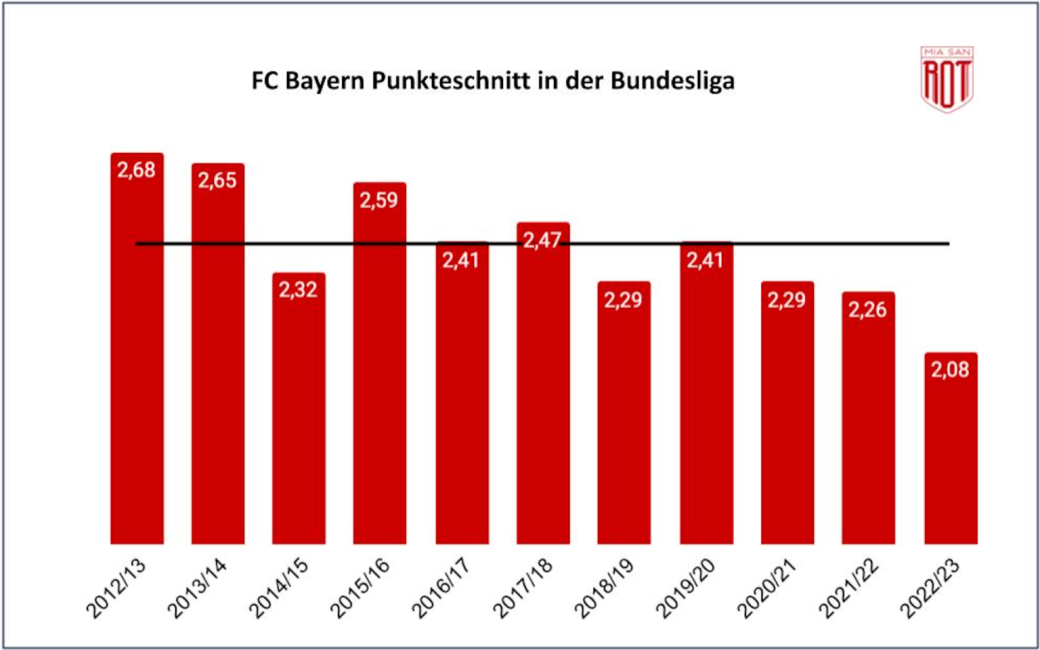Nagelsmann: Why he had to go – the sporting reasons
On Friday afternoon, FC Bayern released their head coach Julian Nagelsmann along with his assistant coaches. In the meantime, Thomas Tuchel has taken over. But what legacy does he leave behind? An analysis of the sporting development under Nagelsmann.
A look back at Nagelsmann’s start at FC Bayern
From Hoffenheim via Leipzig to Munich
At the tender age of 28 in February 2016, Julian Nagelsmann, to the surprise of many, was appointed head coach at TSG Hoffenheim after the club bosses around Dietmar Hopp had seemingly acquiesced in the notion that their club was sure to be relegated from the Bundesliga at the end of the season. Nagelsmann’s appointment was not even a last-ditch effort in a desperate attempt to keep Hoffenheim in the league, he was appointed with a view to rebuilding the team on a completely new footing in the 2. Bundesliga. But, lo and behold, in what was an even more surprising turn of events, he against all odds managed to keep the club from the small Baden-Württemberg town Sinsheim in the league. Only a year later, he led the TSG all the way to the Champions League qualifiers, where he was defeated by eventual finalists Liverpool. On his next stop at Leipzig, he led the self-styled “red bulls” to the semi-finals of the Champions League, where, however, Paris Saint-Germain turned out to be too strong an opponent.
Then came the leap to the industry leader, where he took over from Hansi Flick, who had won a sextuple a year earlier but faced more and more problems in the 2020/21 season and ultimately left the record champions for the DFB. Nagelsmann was initially able to rely on the core of the record smashing team of his predecessor. Thiago and David Alaba had left FC Bayern, but Leroy Sané, Marcel Sabitzer and Dayot Upamecano, among others, formed a string of formidable reinforcements.
High expectations…
FC Bayern’s most visible commitment to the liaison with their new head coach was the unprecedented transfer fee for Nagelsmann accompanied by a generous five-year work contract. These were clear signs that this collaboration was meant to be a long-term project. The expectations of the coach were equally high: to extend the championship winning run, to play for the crown in the Champions League, and, please, also to produce a dazzling playing style that would arouse the emotions of the fans. Also, he was expected to integrate players from the club’s youth academy into the first team.
…and a mediocre debut season
Julian Nagelsmann’s first year did not go well. Although he achieved the tenth title in a row in the Bundesliga, job done. But as easy as winning championships seems to be for FC Bayern, doing so should be taken for granted at a top club, especially at Bayern’s level of consistency. One only has to look to France, where PSG failed to win two titles in the same period, or to Italy, where former leaders Juventus have recently fallen on very hard times.
Nevertheless, winning league title is a must for the Bavarian signature club. Arrive on time for training. Don’t miss games. Be champions. This is the bare minimum that is all but taken for granted, every day, every week, every year. That both cup competitions ended in bitter disappointment didn’t fit this bill at all and was a first stain on Nagelsmann’s record. The 0-5 to Gladbach in the second round of the DFB-Pokal was Bayern’s highest ever DFB-Pokal defeat. The quarter-final exit in the Champions League against Villarreal was perhaps the biggest slip-up on the international stage since the elimination against B 1903 Copenhagen in the 1991 UEFA Cup.
Being knocked out like that leaves marks on a club like FC Bayern, a club that is so notoriously used to success. The cherry on top of the cake of Nagelsmann’s mediocre debut season is the generally weak second half of the season.
But FC Bayern were patient. They trusted the young coach. At least, he had reached the minimum goal of winning the league championship. Nagelsmann’s first year was filed under getting used to a new situation. But in the second year he would have to deliver. Besides, the squad could be better tailored to his requirements next year.
The reasons for Nagelsmann’s failure in the second year
Lewandowski’s departure a curse and a blessing
Nagelsmann’s second year began as a case of competing factors. On the one hand, the club invested almost €140 million in five new signings, of whom Sadio Mané and Matthijs de Ligt can be seen as reinforcements for the top and Ryan Gravenberch, Noussair Mazraoui and Mathys Tel as reinforcements for the breadth of the squad.
At the same time, Robert Lewandowski left FC Bayern, a player whose individual class could not be replaced like for like. But Lewandowski had also never really warmed up to Nagelsmann’s idea of the game, complaining about too many players in the box, in his natural habitat. Presumably, a system without Lewandowski could mean additional creative freedom for Nagelsmann. With players like Mané, Gnabry, Müller or Coman, Bayern could play with “false” strikers up front. After all, FC Bayern would not be the first club to be successful without a classic nine.
As we know now, this plan never fully worked out without drawbacks, but it is clear that even without the Polish super striker, FC Bayern should be able to play more dominant, confident, stable football than they did for long stretches of the 2022/23 season – and thus in most of the Nagelsmann era.
The sporting record: too little in the A and B categories
Before Nagelsmann took over, FC Bayern:
- became Bundesliga campions nine times in a row from 2012/13 to 2020/21;
- reached at least the semi-finals, winning two titles in seven out of ten years in the Champions League from 2011/12 to 2020/21;
- reached at least the DFB-Pokal semi-finals eleven times in a row, winning six titles from 2009/10 to 2019/20.
Those are the hard facts. This is a form of dominance perhaps never seen before in world football. That was the bar against which Nagelsmann was held. That was unfair. And yet it was right, because it is this level of expectation that makes FC Bayern FC Bayern.
Performance in the Bundesliga
In comparison, the performance under Nagelsmann in the Bundesliga has been below average. His two seasons have been the weakest in terms of points in the last ten years, with a downward trend. After 25 match days in the 2022/23 season, FC Bayern is in second place in the table. The last time that happened was in 2012.

Performance in the Champions League
The consistency that his team lacked in the Bundesliga was, however, evident for long periods in the Champions League. In both 2021 and 2022, FC Bayern concluded the group stage with a perfect record of six wins in six matches. Paradoxically, consistency in the group stage of the Champions League is only of modest indicative value of a team’s chances of winning. Unlike in a full league system, the Champions League does not ultimately reward the team that plays best consistently over ten months, but the one that comes out on top at certain points in the highlight matches in the spring.
Titles are the hard currency in the Champions League. Half points can be earned by reaching the finals and semi-finals. Nagelsmann failed to do either in the first year. In the second year, he was deprived of the chance.
What was missing was something special
Nagelsmann is no Zidane or Ancelotti. He was not brought in to lead the team as a CEO type of coach, just by motivating it and sending it out on the pitch with a Kaiser Franz’s “go out there and play football”. He was also brought in because he is one of those modern coaches with ideas and concepts that create wow! moments. The fact that he also has leadership skills makes him an all-round package.
Nagelsmann’s football was not boring or uninspired, au contraire. He had plenty of tactical ideas. Some of the pressing and gegen-pressing worked brilliantly. Tucked-in full-backs, an asymmetrical back three/four and generally his focus on dominating the centre – all that was tactically impressive. But the big wow! effect? That was missing.
Where was the innovation that Tobi Escher would mention in his next book? Why are there no podcasts on “how Nagelsmann reinvented Kimmich as a false six (or eight? ten?) and how he ended up in the top three contenders for the Ballon d’Or, but really should have won”? Where was the fluid striker-less system to successfully replace Lewandowski as a collective (which could briefly be seen at the start of the 2022/23 season)?
Presumably Nagelsmann would have had ideas here too. One of the findings by FC Bayern after Nagelsmann’s mediocre first season was, paradoxically, that he had experimented too much. To tone the tinkering down was advice he heeded in his second season. Advice he might not heed the next time around.
Conclusion
In the end, Julian Nagelsmann failed not because of one defeat against Leverkusen. But because in 21 months as coach of FC Bayern he did not manage to dominate the Bundesliga as FC Bayern did for a large part of the last decade. Because the two embarrassing cup defeats to Gladbach and Villarreal from the first season were too big a debt to pay down.
It was a failure against a brutal expectation. An almost outrageous expectation. That’s why Nagelsmann’s failure will not leave a lasting scar, neither on him nor FC Bayern. Nagelsmann will continue on his path. He has passed muster for further employment at Europe’s elite clubs.
And FC Bayern’s decision in his favour is not made wrong by his premature release. It would have been wrong if FC Bayern had held on to Nagelsmann out of principle and because of the transfer fee and long contract duration. But part of a five-year plan is to constantly evaluate the plan and, if necessary, intervene in time before the goals are out of reach. FC Bayern saw its goals in danger, FC Bayern acted.




 March 28, 2023
March 28, 2023 





Hi George thanks for your time compiling this assessment. It is a very fair one, and I can see that you’re in favour with the decision (to release Nagelsmann). As his fan and someone who believe he deserves more time, I also have to admit the overall performance game-per-game has never really convinced me. There were some really good moments, good short periods, but just when I started to hype myself, the team faces a downward trend. The elimination by Villarreal last season in the Champions League was especially disappointing. While I don’t really agree with this sudden and risky move, I understand the logic behind and I can’t blame the board for thinking and doing so.
I know the odd is low, but this morning I read that Nagelsmann is being approached by Chelsea, who just sacked Graham Potter whom they hired 7 months ago after sacking Thomas Thuchel.
Imagine Tuchel’s Bayern vs Nagelsmann’s Chelsea at the CL semi-final. It might be the most Hollywood football scenario ever and it will consume a high media volume.